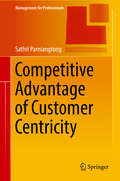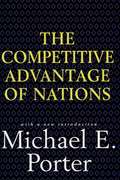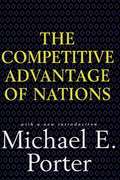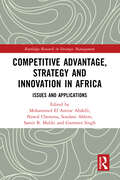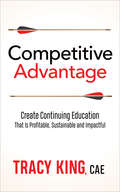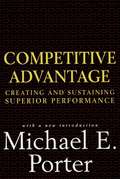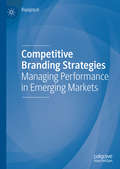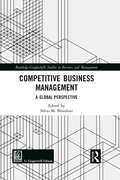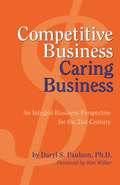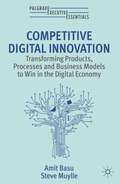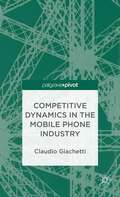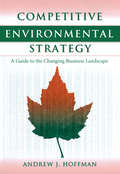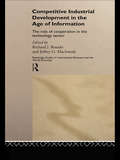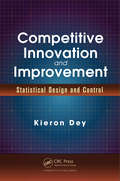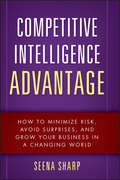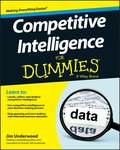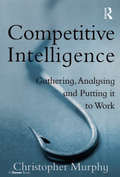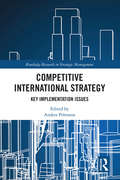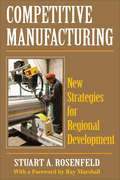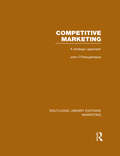- Table View
- List View
Competitive Advantage of Customer Centricity (Management for Professionals)
by Sathit ParniangtongThis book presents strategies that put the customer at the center of an enterprise. It elaborates on the reasons for viewing customers as assets that a firm needs to acquire, develop and cultivate in order to generate profitable relationships, and champions customer profitability as the metric for measuring business performance. Further, it advocates the need to provide solutions to customers' requirements with bundles of products and services. It broadens the definition of customer value beyond tangible benefits and price to include both tangible and intangible benefits and total ownership costs, while embracing a variety of unique customer needs. The book highlights the value of business planning, marketing and sales mechanisms and changing employee behavior to create lifelong, high-value profitable customer relationships that satisfy the customer's needs. Competitive Advantage of Customer Centricity maps a new journey that entire organizations must undertake in order to achieve these lucrative goals.
Competitive Advantage of Nations
by Michael E. PorterA four-year, ten-nation study of the patterns of competitive success in leading countries concludes that companies achieve competitive advantage through acts of innovation. A nation's capacity to innovate is affected by four broad attributes, the "diamond" of national advantage: 1) factor conditions; 2) demand conditions; 3) related and supporting industries; and 4) firm strategy, structure, and rivalry. Based on this analysis, government and companies should act as catalysts and challengers, but not get directly involved in competition.
Competitive Advantage of Nations: Creating and Sustaining Superior Performance
by Michael E. PorterNow beyond its 11th printing and translated into twelve languages, Michael Porter's The Competitive Advantage of Nations has changed completely our conception of how prosperity is created and sustained in the modern global economy. Porter's groundbreaking study of international competitiveness has shaped national policy in countries around the world. It has also transformed thinking and action in states, cities, companies, and even entire regions such as Central America. Based on research in ten leading trading nations, The Competitive Advantage of Nations offers the first theory of competitiveness based on the causes of the productivity with which companies compete. Porter shows how traditional comparative advantages such as natural resources and pools of labor have been superseded as sources of prosperity, and how broad macroeconomic accounts of competitiveness are insufficient. The book introduces Porter's "diamond," a whole new way to understand the competitive position of a nation (or other locations) in global competition that is now an integral part of international business thinking. Porter's concept of "clusters," or groups of interconnected firms, suppliers, related industries, and institutions that arise in particular locations, has become a new way for companies and governments to think about economies, assess the competitive advantage of locations, and set public policy. Even before publication of the book, Porter's theory had guided national reassessments in New Zealand and elsewhere. His ideas and personal involvement have shaped strategy in countries as diverse as the Netherlands, Portugal, Taiwan, Costa Rica, and India, and regions such as Massachusetts, California, and the Basque country. Hundreds of cluster initiatives have flourished throughout the world. In an era of intensifying global competition, this pathbreaking book on the new wealth of nations has become the standard by which all future work must be measured.
Competitive Advantage, Strategy and Innovation in Africa: Issues and Applications (Routledge Research in Strategic Management)
by Gurmeet Singh Abdelli, Mohammed El Amine Nawal Chemma Soudani Ahlem Samir B. MalikiThe competitiveness of companies plays an important role in developing their effectiveness. But technology provides a strong competitive advantage to the companies and helps in achieving the sustainable development. This edited collection discusses various methods by which a firm can create a competitive advantage in a dynamic situation. The book highlights the strategies in global decisions related to changing business models and processes in the innovation era. The contributions by authors take readers through emerging trends in innovation that can support managers in making more strategic decisions, while reducing reconciliation and report preparation. In a hyper-competitive environment, this book will assist researchers and management practitioners in appreciating new strategic sources. Radical strategies and competitive innovation, sustainable development, competitiveness, SMEs, direct and indirect investment, delocalization of businesses, and value creation will all be discussed in depth. Overall, this volume will help readers understand the importance of real-time smart business sources to gain a competitive advantage. Competitive Advantage, Strategy and Innovation in Africa provides essential information on contemporary issues and challenges in management and change strategies. It will serve as a reference for academicians, researchers, and practitioners interested in the rapid transformation in the management sector due to technological advancement and high competition between companies.
Competitive Advantage: Create Continuing Education That Is Profitable, Sustainable, and Impactful
by Tracy KingCompetitive Advantage helps leaders create a reliably profitable and sustainable learning portfolio that generates the sought-after impact. Based on a proprietary 25-driver Scoreboard created by Tracy King CAE, Competitive Advantage helps clients develop a profitable and sustainable business that makes a measurable impact on the industries they represent. Workforce disruptions, new technologies, and tight budgets place enormous pressure on professional association continuing education teams. Old learning formats and pricing models are failing. The risk of irrelevance is imminent as competitors step into the market, creating targeted learning programs faster and cheaper. Not to mention that learner expectations are changing: what they want, when they want it, and how much they are willing to pay for it.Competitive Advantage serves the professional association industry’s leadership. Tracy helps leadership determine what investments to make with a limited budget, learn the common mistakes associations make managing their learning portfolio, find key investments that differentiate a program from competitors, identify partnership opportunities that result in passive revenue streams, and so much more. Quick fixes feel good, but never produce lasting results. Competitive Advantage focuses on the things that do produce lasting results and the commitment required to develop a successful learning design.
Competitive Advantage: Creating and Sustaining Superior Performance (Review Book Ser.)
by Michael E. PorterThe essential complement to the pathbreaking book Competitive Strategy, Michael E. Porter's Competitive Advantage explores the underpinnings of competitive advantage in the individual firm. With over 30 printings in English and translated into thirteen languages, this second volume in Porter's landmark trilogy describes how a firm actually gains an advantage over its rivals. Competitive Advantage introduces a whole new way of understanding what a firm does. Porter's groundbreaking concept of the value chain disaggregates a company into "activities," or the discrete functions or processes that represent the elemental building blocks of competitive advantage. Now an essential part of international business thinking, Competitive Advantage takes strategy from broad vision to an internally consistent configuration of activities. Its powerful framework provides the tools to understand the drivers of cost and a company's relative cost position. Porter's value chain enables managers to isolate the underlying sources of buyer value that will command a premium price, and the reasons why one product or service substitutes for another. He shows how competitive advantage lies not only in activities themselves but in the way activities relate to each other, to supplier activities, and to customer activities. Competitive Advantage also provides for the first time the tools to strategically segment an industry and rigorously assess the competitive logic of diversification. That the phrases "competitive advantage" and "sustainable competitive advantage" have become commonplace is testimony to the power of Porter's ideas. Competitive Advantage has guided countless companies, business school students, and scholars in understanding the roots of competition. Porter's work captures the extraordinary complexity of competition in a way that makes strategy both concrete and actionable.
Competitive Advantage: Delivering the Creative Value Proposition-Strategy the India Way
by Michael Useem Peter Cappelli Harbir Singh Jitendra V. SinghThe India Way stands in striking contrast to the business practices of other countries and offers valuable lessons for Western executives looking for innovative ways to grow their companies. In this chapter, authors Peter Cappelli, Harbir Singh, Jitendra Singh, and Michael Useem focus on the distinctive ways in which Indian business leaders find competitive advantage and new customers through creative value propositions. The authors look closely at Bharti Airtel's shockingly innovative reverse outsourcing of its mobile telephone network, Cognizant Technology Solutions' counterintuitive offering of first-class IT services at rock-bottom prices, and Hindustan Unilever's "Project Shakti," a system for selling products via rural self-help groups. Taken together, these stories richly illustrate how organizational architecture, company culture, and competitive strategy form the heart of the India Way of doing business. This chapter was originally published as Chapter 5 of The India Way: How India's Top Business Leaders Are Revolutionizing Management.
Competitive Battles: How to Size Up Competitors
by Clayton M. Christensen Scott D. Anthony Erik A. RothSizing up a head-to-head competition first involves assessing the combatants' strengths and weaknesses. Firms measure each others' resources, processes, and values. Where asymmetries develop between capabilities and market demands, opportunities arise for disruption. This chapter discusses why companies must continually scan a broad competitive horizon for both direct and indirect assaults.
Competitive Branding Strategies: Managing Performance in Emerging Markets
by RajagopalGlobalization has expanded the options for building brand strategies through social media, the internet, and in conventional approaches. Amidst increasing market competition, companies need to analyze their competitive choices to determine their brand equity in the marketplace. As such, it is necessary for companies to develop customer-focused brands to gain competitive advantage. This book enhances knowledge on developing competitive brands in emerging markets, particularly the BRICS countries. It provides the necessary guidance with proven strategies for building successful brands, the decisions and options faced by brand managers, and the tools to manage brands effectively. It develops new dimensions on brand management strategies by analyzing best practices based on proven strategies. Readers will not only gain insight into international brand competition, but also into the organizational support necessary to build and manage a powerful brand. It is a necessary read for all MBA students and scholars in marketing, especially those who seek to gain new insight in the rapidly changing global marketplace.
Competitive Business Management: A Global Perspective (Routledge-Giappichelli Studies in Business and Management)
by Silvio M. BrondoniThe growth of global corporations has led to the development of new business strategies whose complexity and configuration rest on corporate networks; corporate cross-culture and intangible corporate and product assets. In global markets, corporations compete in a competitive marketspace dimension, in other words, competitive boundaries in which space is not a stable element of the decision-making process, but a competitive factor whose complexity depends on markets increasingly characterized by time-based competition and over-supply. In view of today's fierce competition from US and Southeast Asian corporations, this book highlights global business development policies based on innovation, sustainability and intangible assets. The book assesses competitive business management from a global perspective, examining business development policies linked to the profitability of global firms. It forces readers to actively think through the most fundamental policies developed by global firms in the current competitive landscape and provides answers to questions such as: What are the new drivers of global capitalism?; How do global businesses deal with new local nationalism?; Which governance systems and behavioural norms qualify global businesses?; What are the main business policies that characterize competitive business management in a global competition perspective? Competitive Business Management neatly explains the global business management domain and helps readers to gain an understanding of global development business policies.
Competitive Business, Caring Business: An Integral Business Perspective for the 21st Century
by Daryl PaulsonCompetitive Business, Caring Business is designed to provide managers and executives with new tools and methods for finding personal satisfaction in their unique contributions to the teams, companies, or industries they serve. The author, Daryl Paulson, the CEO of BioScience Laboratories, Inc., has successfully combined science and business in his personal and professional life and demonstrated in clear, simple, practical terms the true meaning of "integral business." In Competitive Business, Caring Business, he shows how the work of Ken Wilber, the world's foremost human science theorist, applies in the business domain. Paulson explains why the process of "doing business" must be considered in a holistic and integral manner if it is to meet the needs of the 21st century. Readers will learn how a win-win strategy can be developed which satisfies individual employees, work teams, senior management, and shareholders, as well as society and larger global concerns. Unlike other approaches, Paulson's integrative process of doing business is at once profitable, personally satisfying, and beneficial to the environment.
Competitive Digital Innovation: Transforming Products, Processes and Business Models to Win in the Digital Economy (Palgrave Executive Essentials)
by Amit Basu Steve MuylleInnovative digital technologies are forcing companies to rethink how they compete. The focus of digital innovation in business has shifted from internal transformation within firms to their market interface and ecosystems. While opportunities for innovation in internal operations are well established, it’s less clear how to leverage technology at the market interface. This often has strategic implications, and the goal of this book is help you connect digital innovation to business strategy. By understanding how to leverage digital technologies, you can redefine your market-facing business processes, your products, services and even your business models and stay competitive in today’s hybrid markets. This book provides a coherent and comprehensive approach to not just survive but rather thrive in the 21st Century global marketplace. With global, real-world examples and original frameworks, this is an ideal book for executives and anyone who wants to understand digital strategy. Highly practical but infused with rigorous research, it shows you how your business can use digital technologies to compete in today’s hybrid markets.
Competitive Dynamics in Home Video Games (A): The Age of Atari
by Peter J. Coughlan Debbie FreierTells the story of the rise and fall of Atari Corp., the dominant player in arcade and home video games in the 1970s and early 1980s. During this period, Atari grew from a $500 initial investment into a $2 billion in revenues per year enterprise, becoming the fastest growing company in the history of the United States. The wild ride came to a crashing halt in 1983, however, when the bottom dropped out of the video game market, partly as a result of Atari's actions (or inaction). This is part of a case series examining the competitive dynamics in the home video game industry from 1970 into the new millennium. A rewritten version of an earlier case.
Competitive Dynamics in Home Video Games (B): Nintendo Power
by Peter J. CoughlanTells the story of Nintendo's revival of the home video game industry in the mid-1980s and its dominance of the market in the late 1980s and early 1990s. Strategic issues addressed include the creation of value by sparking dormant demand and the capture of value relative to other players in the industry including competitors, buyers, suppliers, and complementors. This is part of a case series examining the competitive dynamics in the home video game industry from 1970 into the new millennium. A rewritten version of an earlier case.
Competitive Dynamics in the Mobile Phone Industry
by Claudio GiachettiThis book explores which kind of competitive moves and countermoves have been taken by mobile phone vendors like Nokia, Samsung, Motorola and Apple, as well as emerging rivals from developing countries, to defend their competitive position over the industry life cycle, and which factors have driven these actions.
Competitive Environmental Strategy: A Guide To The Changing Business Landscape
by Andrew J. HoffmanEnvironmental concerns can greatly affect business success, regardless of whether a business person or corporation shares those concerns. Today's corporate managers must understand the power of environmental issues, and shift their mindset from one focused on environmental "management" to one focused on strategy.Competitive Environmental Strategy examines the effects of environmentalism on corporate management, explaining how and why environmental forces are driving change and how business managers can think about environmental issues in a strategic way. The author discusses: the evolving drivers of corporate environmental strategy, including regulators, shareholders, buyers and suppliers, insurers, investors, and consumers how environmentalism alters basic conceptions of competitive strategy and organizational design how external institutions create both opportunity and limitations for environmental strategy how environmental threats can be incorporated into risk management, capital acquisition, competitive position, and other management concerns The book ends with an overall discussion of competitive environmental strategy and draws connections to the emerging issue of sustainable development. Each chapter features insets that ask fundamental questions about the relationship between environmental protection and business strategy, and ends with a list of additional recommended readings. Every individual who wishes to engage in business management in the 21st century will need an appreciation for the implications of environmental issues on corporate activities, and vice-versa.Competitive Environmental Strategy offers a valuable overview of the subject, and provides a wealth of real-world examples that demonstrate the validity and applicability of the concepts for business people, clearly showing how managers are turning an understanding of environmental issues to competitive advantage.
Competitive Industrial Development in the Age of Information: The Role of Cooperation in the Technology Sector (Routledge Studies in International Business and the World Economy #10)
by Richard J. Braudo Jeffrey G. MacIntoshThis book examines how transnational corporations, small to medium enterprises and governments have emerged as the principal players in industrial development. This valuable work examines this trend, with particular reference to the role of the tax policy in technology development, the financing of technology-sector SMEs, the role of government policy and the relationship between competition and co-operation.
Competitive Information Policy at Pratt & Whitney
by Lynn Sharp PaineOfficials at United Technologies Corp. (UTC) must decide on an ethics policy to govern competitive intelligence gathering. The flow of competitor information into the Pratt & Whitney division has declined sharply since adoption of UTC's code of ethics. A rewritten version of an earlier case.
Competitive Innovation and Improvement: Statistical Design and Control
by Kieron DeyCompetitive Innovation and Improvement: Statistical Design and Control explains how to combine two widely known statistical methods‘statistical design and statistical control in a manner that can solve any business, government, or research problem quickly with sustained results. Because the problem-solving strategy employed is pure scientific metho
Competitive Intelligence Advantage
by Seena SharpA practical introduction to the necessity of competitive intelligence for smarter business decisions-from a leading CI expert and speaker In Competitive Intelligence Advantage, Seena Sharp, founder of one of the first Competitive Intelligence firms in the US, provides her expert analysis on the issues and benefits of CI for today's businesses. CI is critical for making smarter business decisions and reducing risks when formulating strategies, leading to more profits and fewer mistakes. This is a practical guide that explains what CI is, why data is not intelligence, why competitor intelligence is a weak sibling to competitive intelligence, when to use it, how to find the most useful information and turn it into actual intelligence, and how to present findings in the most convincing manner. Importantly, Sharp argues that businesses would benefit from shifting their perspective on CI from viewing it as a cost to viewing it as an investment that saves money and provides immediate value. Author Seena Sharp is a noted CI expert who established Sharp Market Intelligence in 1979 Addresses all the most common myths and misconceptions about CI Includes more than sixty examples of when to use CI Completely explains the ins and outs of CI, and why your company will act faster and more aggressively with CI Competitive intelligence is a management tool that is misunderstood and underestimated, yet results in numerous benefits. If you are a senior level executive or operate a business-and you aren't tapping the power of CI to improve your decision making-you are missing a potent advantage.
Competitive Intelligence For Dummies
by James D. UnderwoodMake competitive intelligence part of your business practice--and be on the cutting edgeCompetitive intelligence is the art of defining, gathering, analyzing, and distributing intelligence about products, customers, competitors, individuals, concepts, information, ideas, or data needed to support executives and managers in making strategic decisions for an organization. Competitive Intelligence For Dummies introduces you to this fascinating subject and gives you the tools you need to incorporate it into your business decision-making process.Conducted within an organization, competitive intelligence serves as a catalyst in planning and strategic growth. It is part of the value chain that converts gathered data to actionable information that results in strategic decisions. Competitive Intelligence For Dummies helps readers gather valuable information on the competition, the operational environment, and the target customer. It also explains how to carefully analyze and use this information in decision making processes to gain market share and stay on the cutting edge of an industry.Whether you are just starting a business, venturing into new areas with your existing company, or looking to gain ground on a key competitor, Competitive Intelligence For Dummies gives you insight on how to gather valuable information on not only your competitors, but on your market and key customer base.Gets you up to speed on how to locate, collect, and process competitive intelligenceShows you how to carefully analyze competitive intelligence and disseminate it throughout your organizationIllustrates how competitive intelligence can help you gain market shareIf you're a business owner, analyst, manager, or researcher, Competitive Intelligence For Dummies gives you and your business an edge.
Competitive Intelligence: Gathering, Analysing and Putting it to Work
by Christopher MurphyEvery business manager needs intelligence to find suppliers, mobilize capital, win customers and fend off rivals. Obtaining this is often an unplanned, instinctive process. The manager who has a conscious, systematic approach to acquiring intelligence will be better placed to recognize and seize opportunities whilst safeguarding the organization against the competitive risks that endanger its prosperity - and sometimes even its survival. Christopher Murphy's Competitive Intelligence explains: ¢ the theory of business competition ¢ how companies try to get ahead of their rivals ¢ methods of research and sources of information that generate the raw material for creating intelligence ¢ analytical techniques which transform the mass of facts and opinions thus retrieved into a platform of sound, useable knowledge to support informed business decision making. The text includes plenty of examples and experiences from the author's own consulting experience. He draws on a wide variety of disciplines, including literary criticism (or how to read between the lines of company reports, announcements and media stories) and anthropology (understanding corporate culture), as well as the more obvious ones such as financial analysis, management theory and business forecasting techniques. This fusion of insights from many fields of expertise provides a very readable, practical and imaginative framework for anyone seeking to gather and make effective use of market and company data. While focused on the British business environment, the lessons drawn are of universal application, and examples are taken from across the globe. In addition a chapter is devoted to researching industries and companies in other countries. Although primarily concerned with commercial enterprises, many of the principles and techniques will also be of considerable practical relevance to managers in the public sector or not-for-profit organizations. Competitive Intelligence also provides a legal
Competitive International Strategy: Key Implementation Issues (Routledge Research in Strategic Management)
by Anders PehrssonContemporary businesses are exposed to global competition enhanced by new information technology and liberalized cross-border transactions in many industries. This introduces a new competitive dynamic, influenced by actors in developed and emerging markets. The dynamic puts major demands on executives as they consider future moves that support strategic initiatives. The context of intensified global competition requires attention from practicing (and aspiring) leaders in international business organizations. Drawing on contemporary research, Competitive International Strategy: Key Implementation Issues addresses international business strategy formulation and implementation in the global competitive market. It captures the essential strategy components by elaborating on the implementation of corporate integration and local responsiveness. This is considered a vital dichotomy in the development of international business strategies. Essential components include competition context, firm’s resources, strategy directions and competence, implementation issues, and competitiveness. The book includes several detailed company cases. Bridging the strategy formulation and implementation is crucial for the ultimate success of international business firms. This book will be of great value to students at an advanced level, academics, and reflective practitioners in the fields of strategic management, leadership, and international business.
Competitive Manufacturing: New Strategies for Regional Development
by Stuart A. RosenfeldStuart A. Rosenfeld presents a timely analysis of the problems the United States and other industrialized countries face as they adjust from economies based on natural resources and goods to economies based on quality of human resources and high-performance, market-oriented organizations. Some of the questions raised include: Will American industry successfully face the competitive challenge of the global economy? Can US manufacturing raise productivity and innovate enough to remain healthy? Have the latest advances in process technology and management practice penetrated the rural industrial base? How can public policy help improve the competitiveness of the crucial manufacturing sector?This book challenges the conventional wisdom in economic development policy. Past state and local industrial policy focused on locational decisions, not on issues of competitiveness. Building the competitive advantage of industry is more important than promoting the competitive advantages of location. Incentives to modernize are more important than subsidies to locate.Competitive Manufacturing uses the rural South, the most industrialized rural region of the nation, to examine the strengths and weaknesses of manufacturing as the basis for economic growth. Using historical analysis, surveys, and intensive case studies, the author analyzes the technological capabilities of rural manufacturing, the factors that influence the decision to modernize, and the effects of technology on education and work. Comparative studies in Denmark and Italy point to new directions for US economic development policy.
Competitive Marketing: A Strategic Approach (Routledge Library Editions: Marketing)
by John O'ShaughnessyThis volume is a text-book for students of marketing, providing a basic understanding of the concept and techniques of marketing. It shows how basic background information relating to the UK market may be integrated into business planning and how information from other sources should be incorporated and used.
